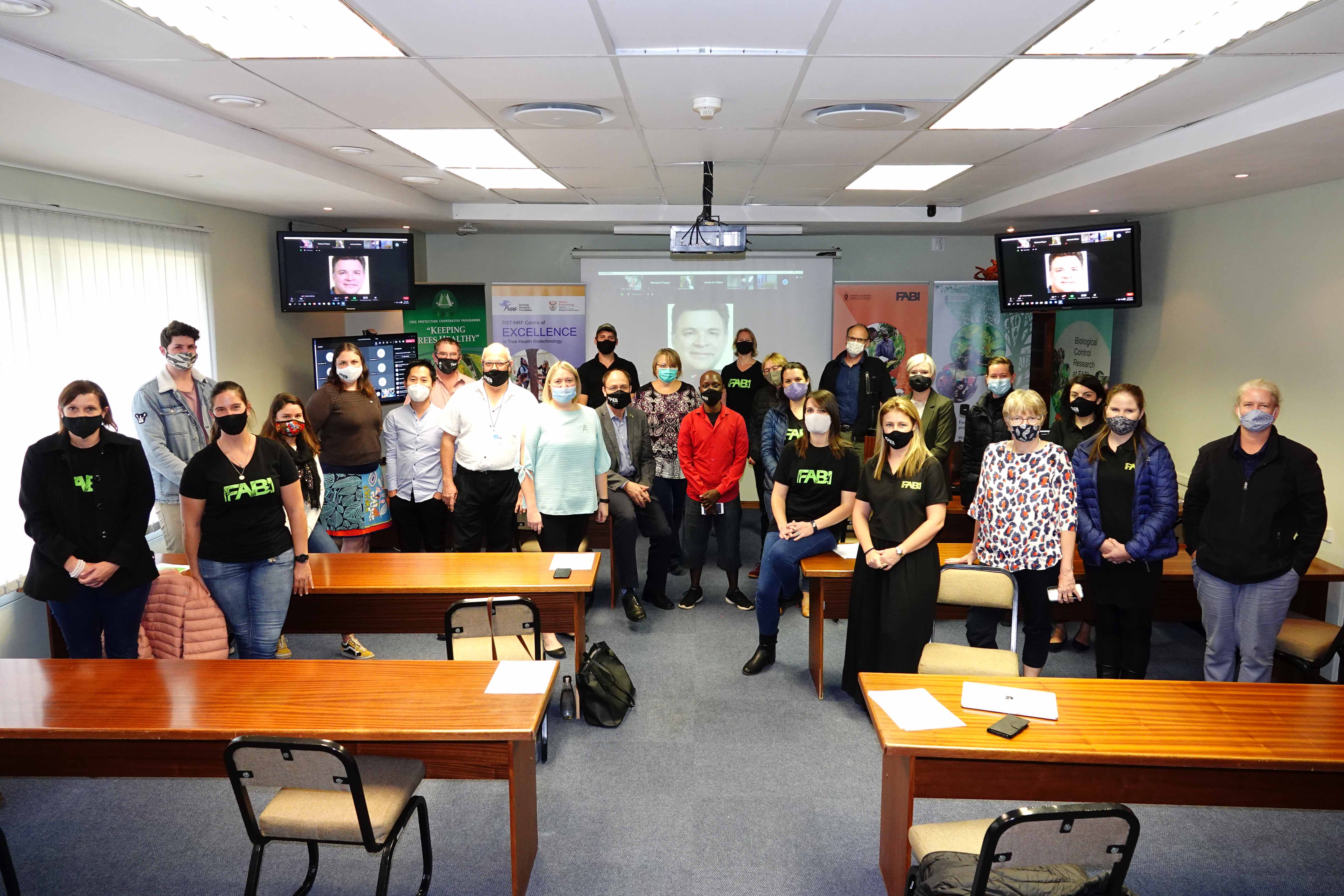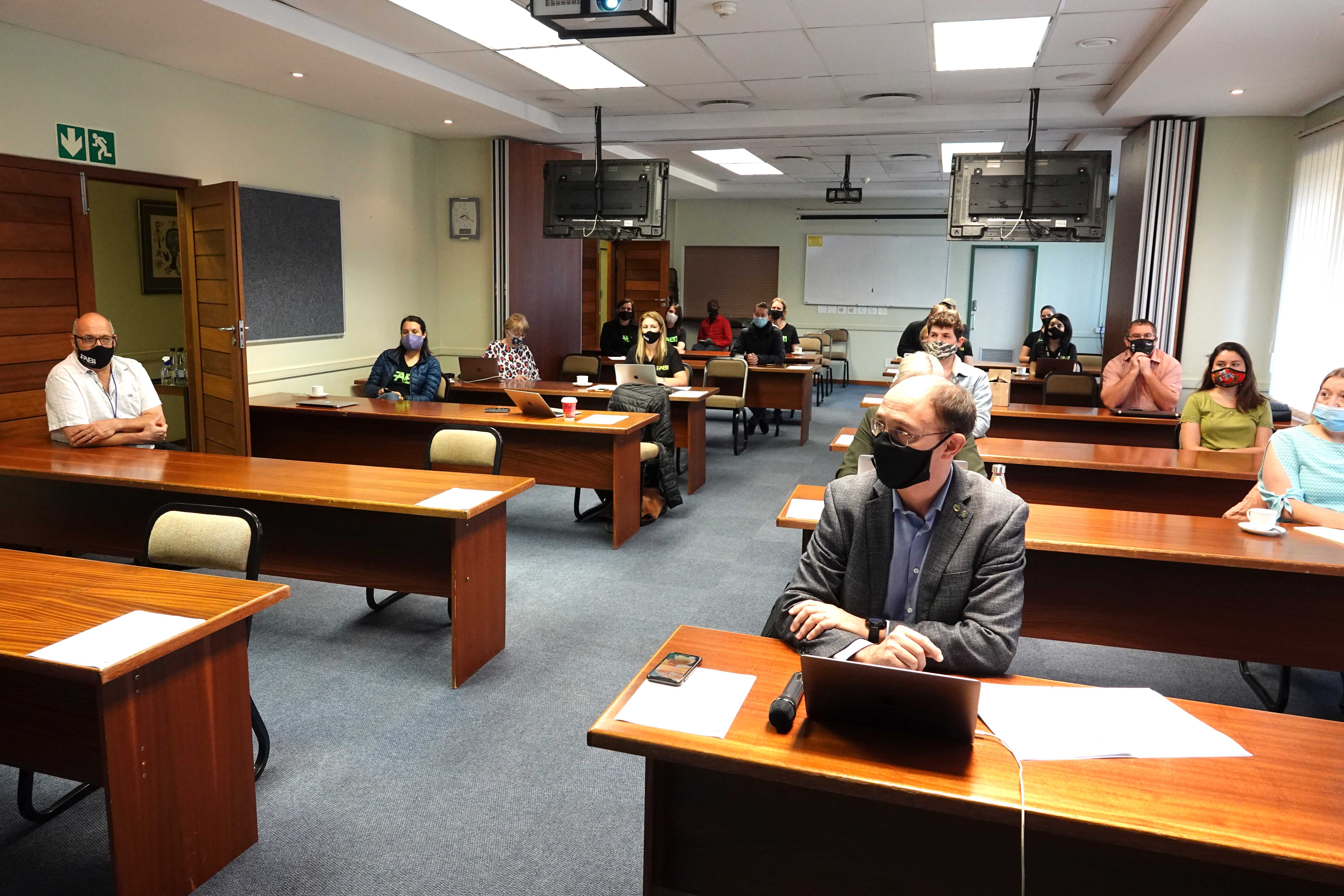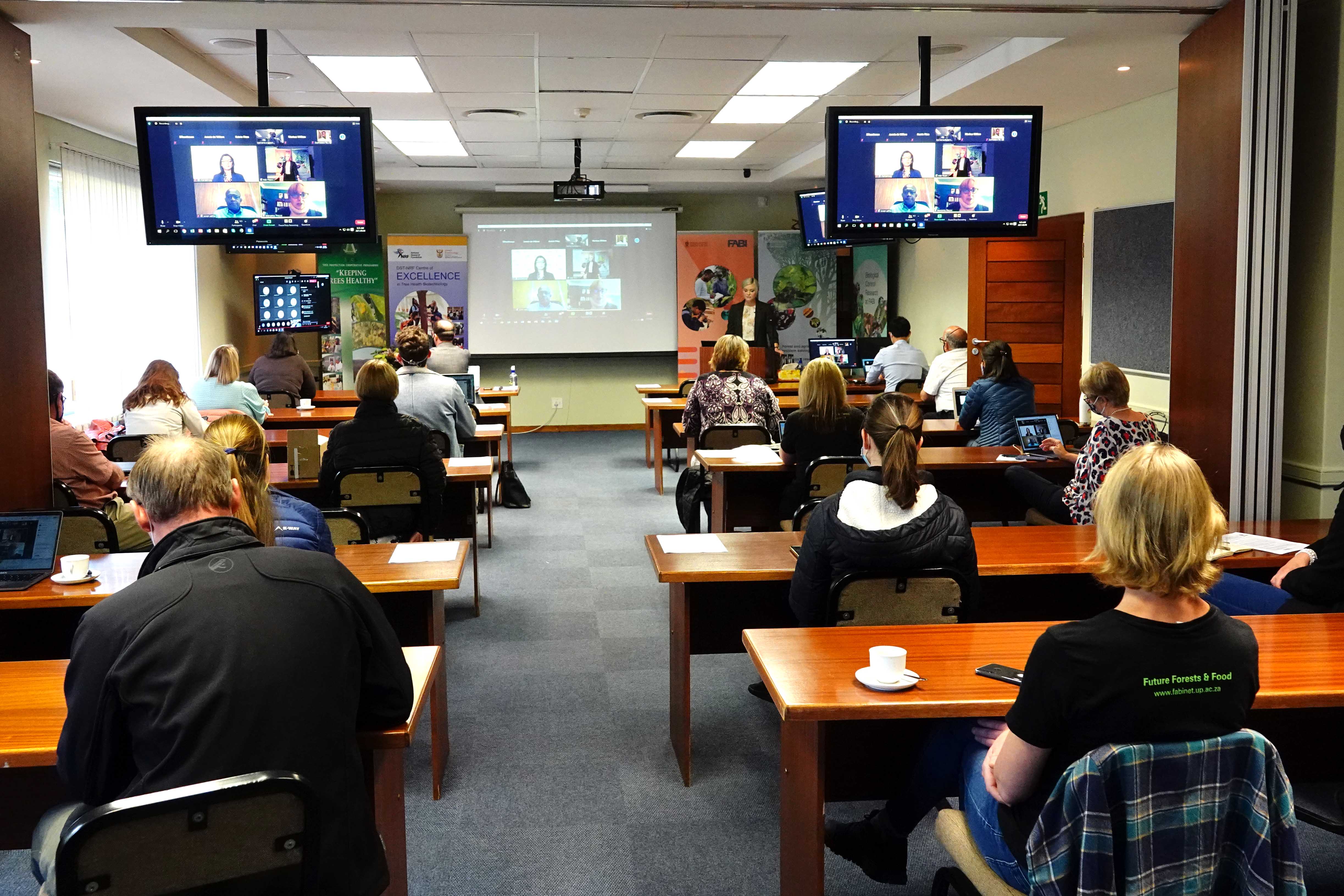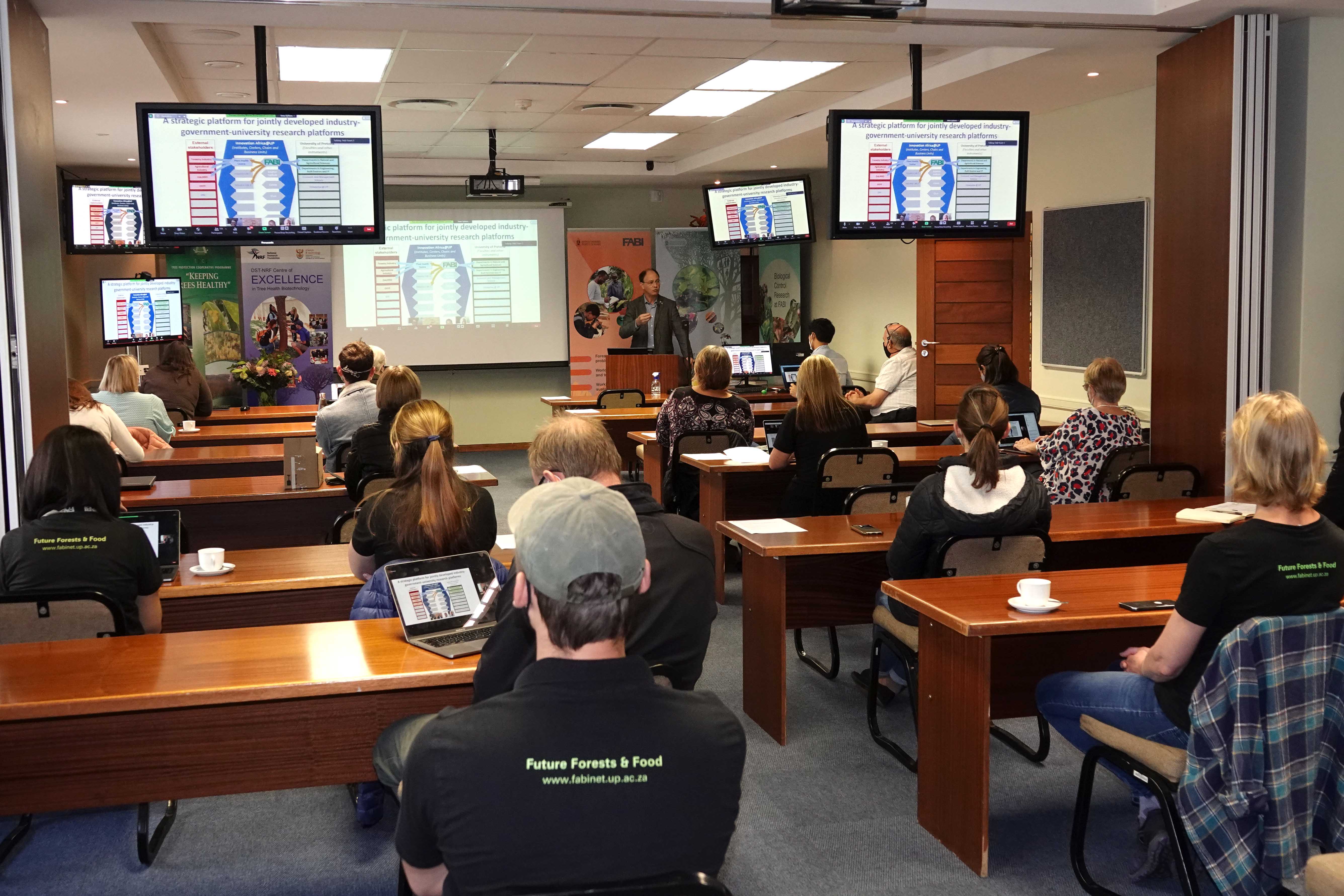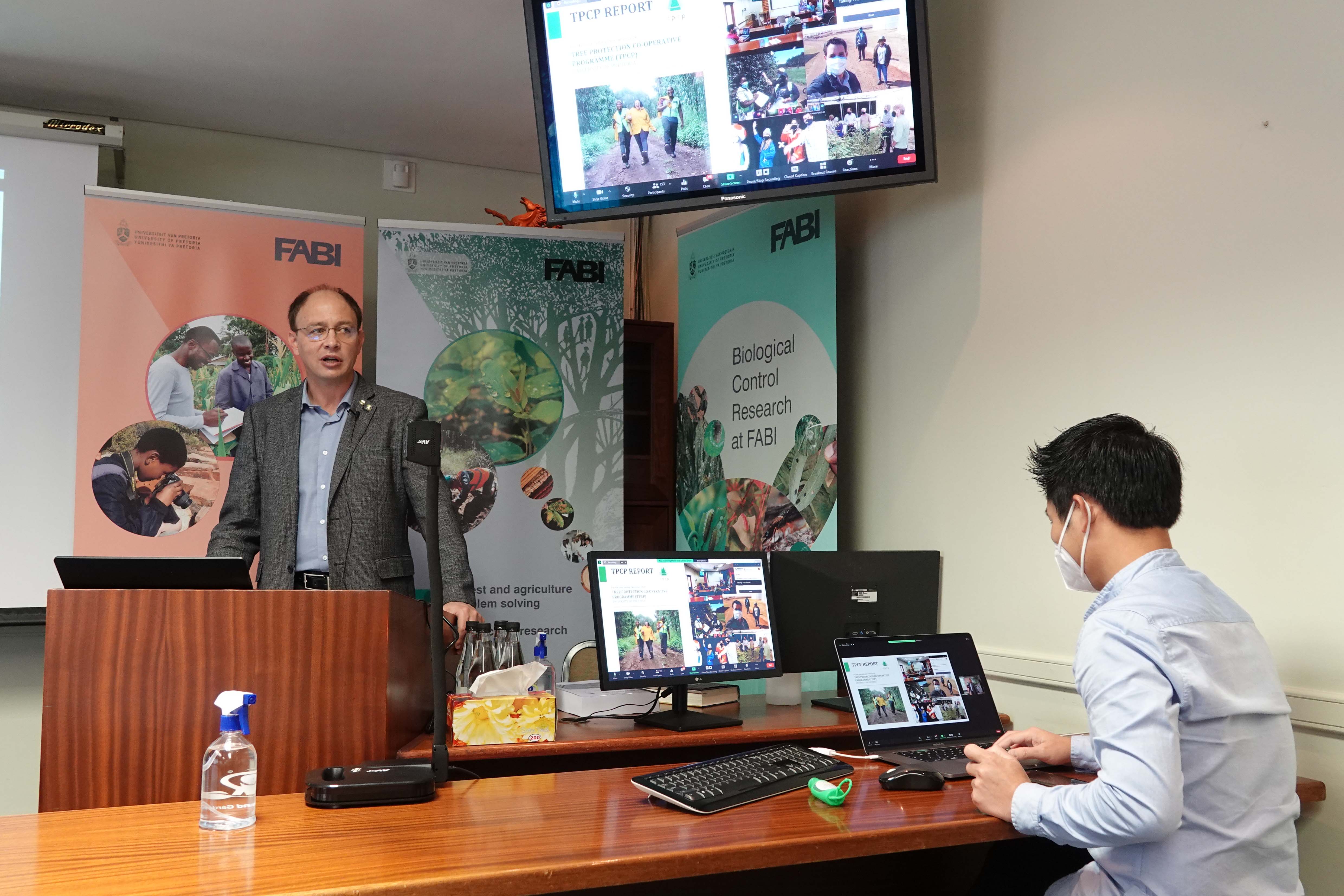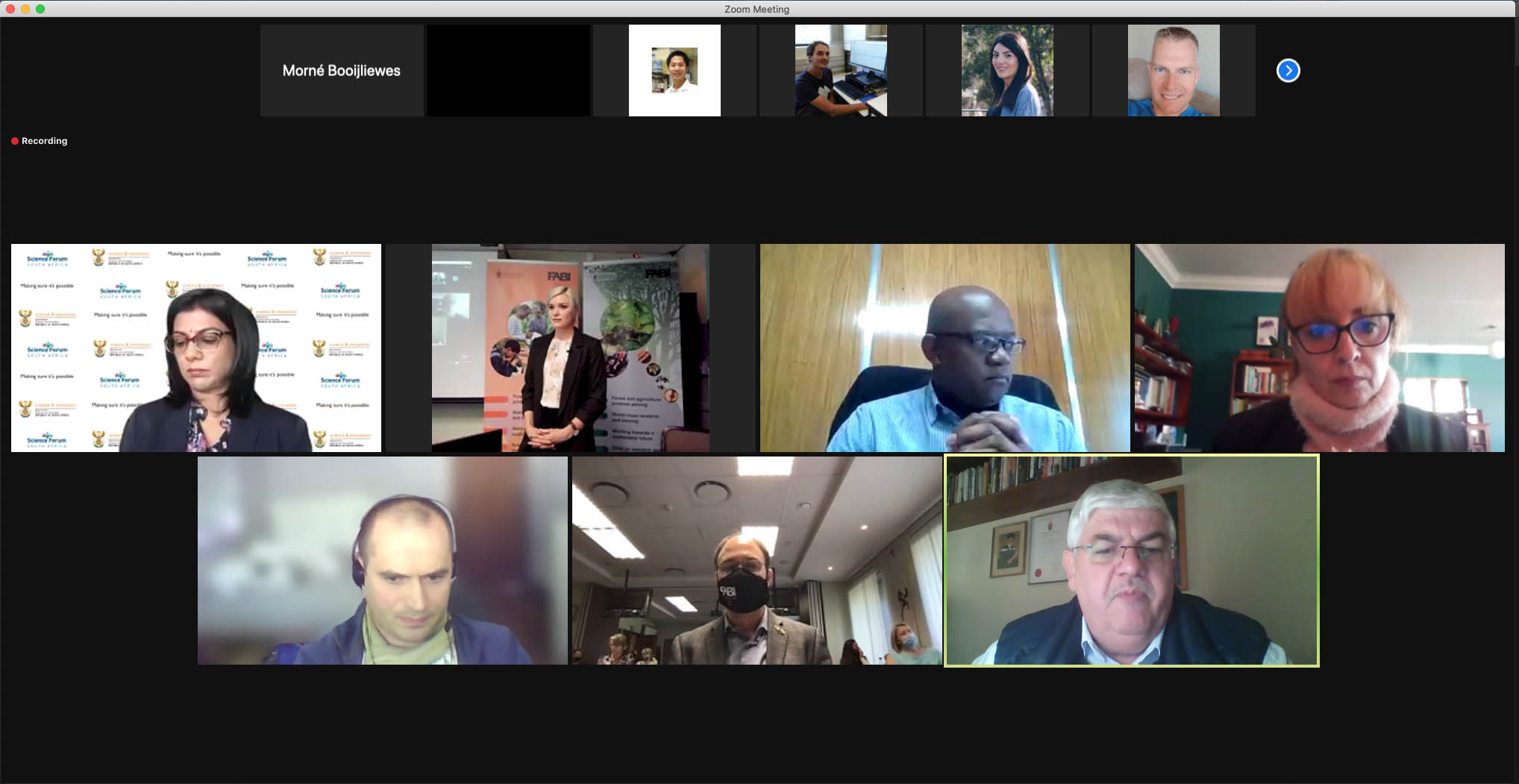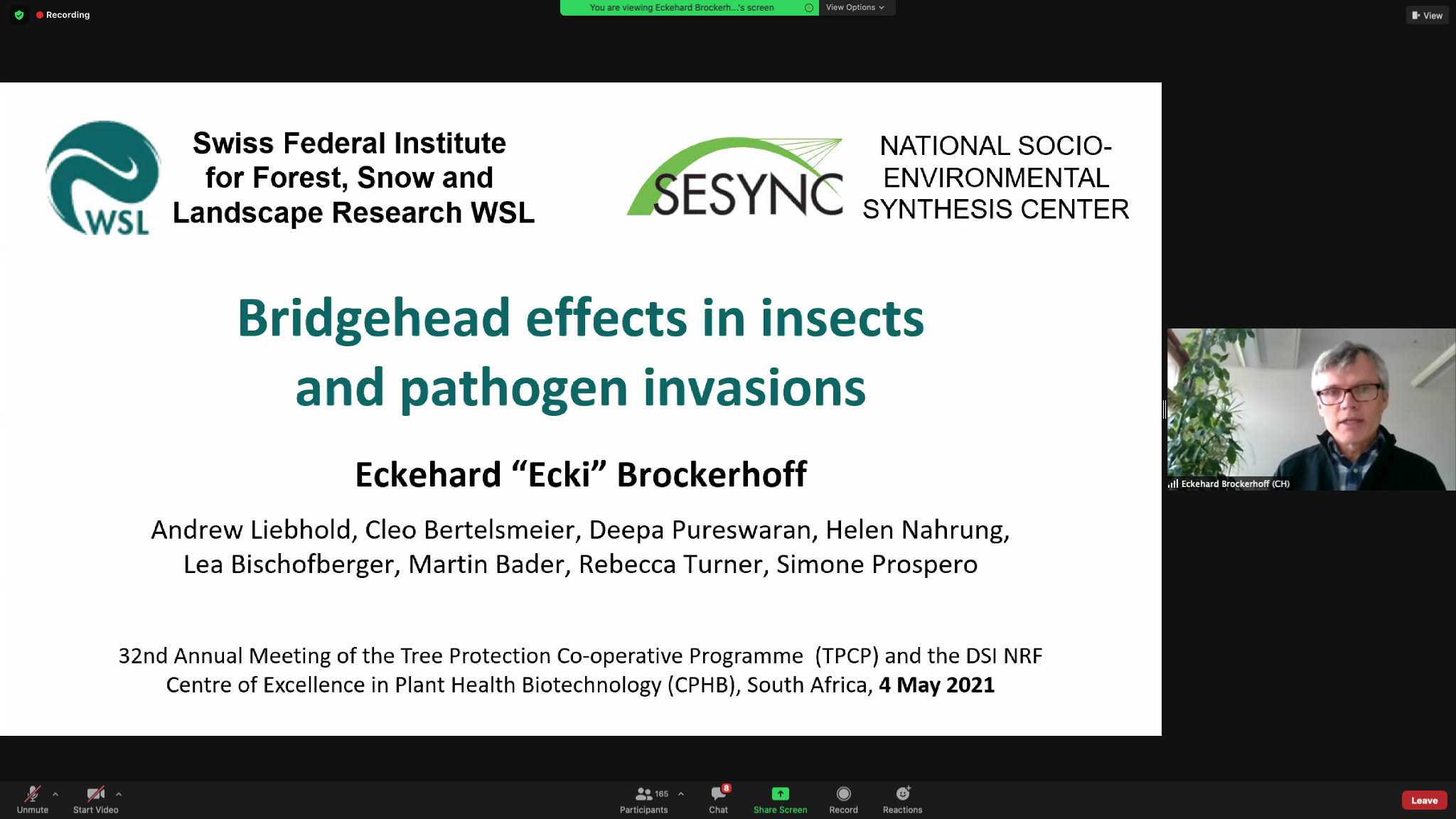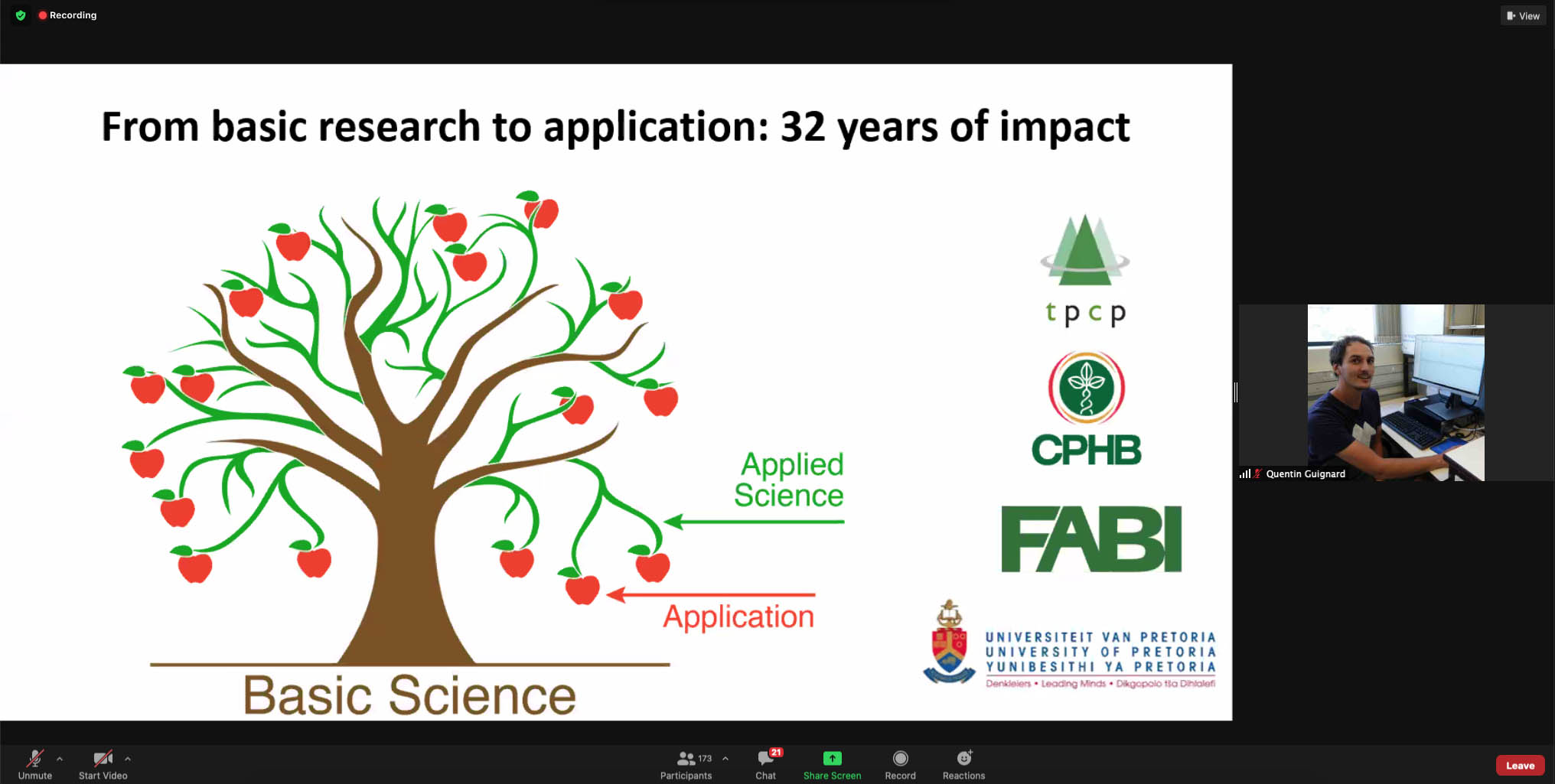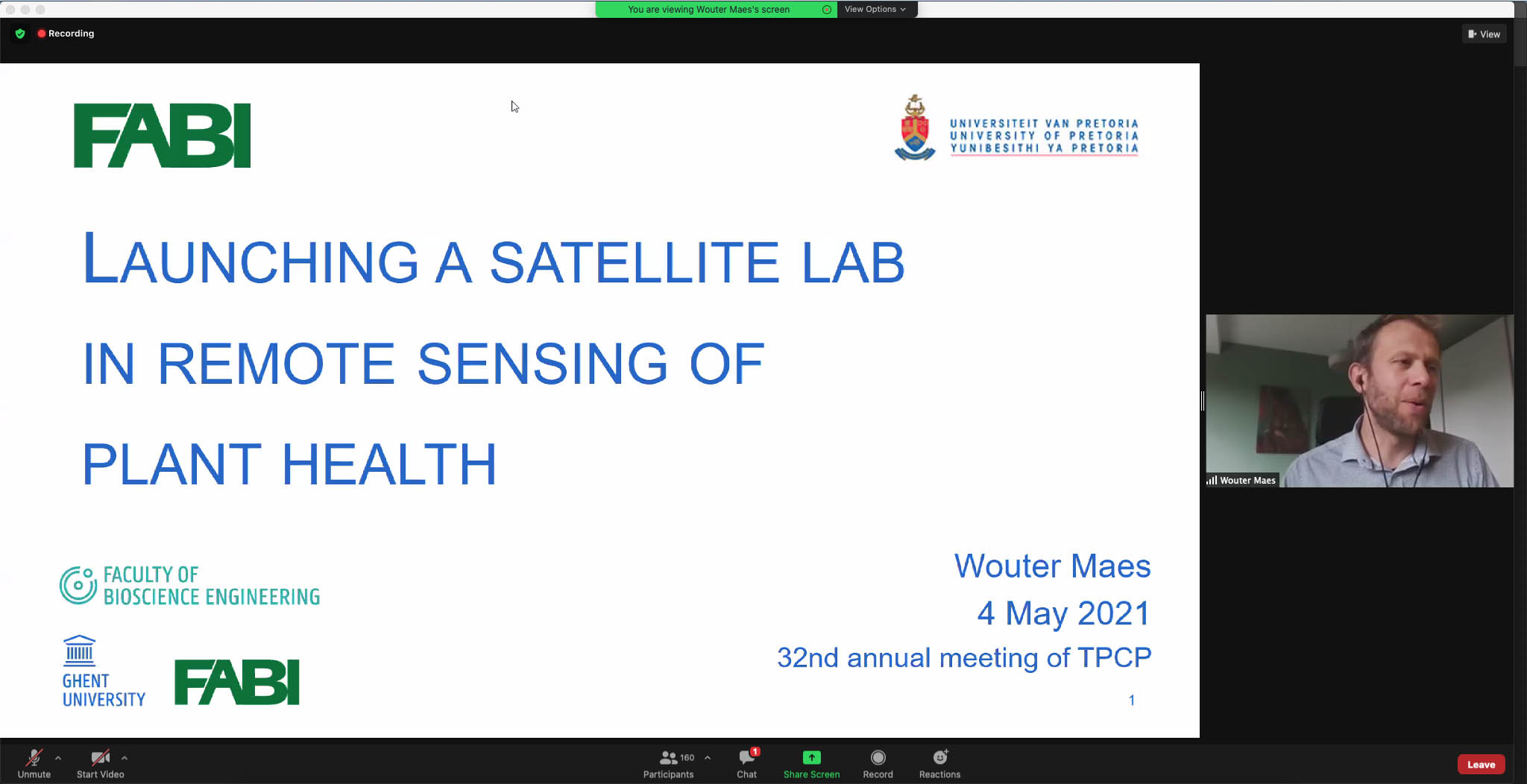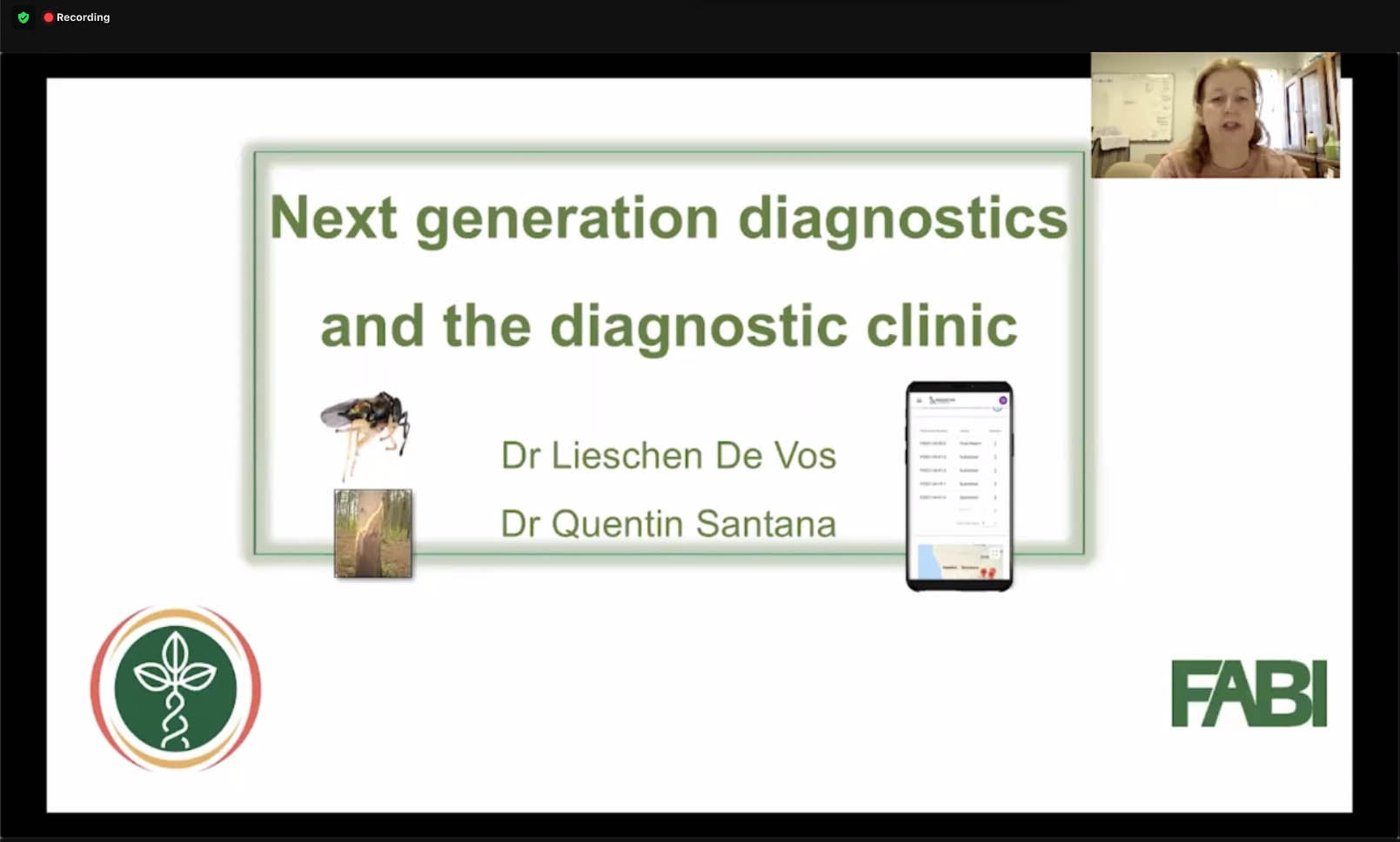32nd Annual Symposium of the TPCP and CPHB 2021-05-10
The 32nd Annual Symposium of the Tree Protection Co-operative Programme (TPCP) and DSI-NRF Centre of Excellence in Plant Health Biotechnology (CPHB) in FABI was hosted as a six-hour long hybrid meeting on 4 May. Some 250 attendees joined from South Africa with guests and collaborators signing in from Asia, Australia, Europe and South America. Transdisciplinary research is at the core of FABI’s success and a common thread through all the presentations this year’s Symposium was ‘partnerships and collaboration’ and the importance of biosecurity. This year’s programme included speakers from both the forestry and agricultural sector, as well as government ministries, demonstrating FABI’s interaction and support across these sectors.
The four sessions had as themes, ‘Industries and universities in partnerships for competitive forestry and agriculture sectors’; ‘Fundamentals of tree health management and biosecurity’; ‘From basic research to application: 32 years of impact’; and ‘Connecting data points for future tree health management’.
Professor Emma Steenkamp opened the Symposium and welcomed all the delegates to this important platform for the TPCP-CPHB to interact with its key stakeholders. She introduced Prof. Anton Ströh, Vice-Principle for Research, Innovation and Postgraduate Education, University of Pretoria (UP). Prof. Anton Ströh described FABI as the most transdisciplinary research platform at UP and praised the Institute for the remarkable amount of work done in the past year despite the challenges and restrictions of the COVID-19 pandemic. He reflected on the importance of the partnerships with industry and government stakeholders in building this platform. The TPCP-CPHB now serves as the foundation for the development of Innovation Africa @UP, a strategic platform for jointly-developed industry-government-university research platforms.
FABI Director, Prof. Bernard Slippers, said the Institute can look back at a very difficult, but successful year. Engagements and even social events were moved online seamlessly. The Institute developed a health and facilities management app to manage COVID-19 regulations. TPCP-CPHB students and staff continued fieldwork and labwork as actively as in previous years (bar two months due to the strict lockdown enforced in the country), and is proud that there has been no work-related transmissions of SARS-CoV-2. A record 85 papers were published in ISI-rated journals, as well as four book chapters and one book. Thirty-two students graduated and 100 students were supported through the programme. The past year also saw the launch of an Internship in Plant Health Biosecurity, the Grain Research Programme, as well as two international satellite labs.
In his opening address to the Symposium, Duane Roothman (Vice President: Sappi Forests) spoke about building a thriving world through partnerships and collaboration. He spoke passionately about harnessing partnerships, collaboration and creating shared value as a way of creating a thriving economy. “The best ideas and innovations spring from coalitions of diverse perspectives, where we invite partners to help us accelerate meaningful change,” he explained. He described FABI and the TPCP-CPHB as a shining example of partnership and collaboration. “We must break barriers to increase efficiency. Through continued collaboration and partnerships we can become more competitive, more sustainable by protecting and future-proofing the bio-material that drives a transformative circular economy,” he concluded.
Jannie de Villiers, CEO of Grain SA, said that there was a lot to be gained by collaborating with industries that have not previously done so such as agriculture and forestry. He explained that the partnership with FABI had come about after they realised they had some “holes below the waterline of their research ship”. “We need to work above our “silos” and develop consortia to cross-cut across disciplines and we need to grow partnerships and collaborate to make Public-Private Partnerships work”. He spoke about his dream to see not only South Africa, but Africa, as a food secure and being able to care for its people - a dream we share at FABI.
A panel discussion titled “Partnerships for Biosecurity” was chaired by Dr Miekie Human (Research and Policy Officer at Grain SA). Participants included Dr Julian Jaftha (Chief Director: Plant Production & Health, Department of Agriculture, Land Reform and Rural Development), Dr. Marianna Theyse (CEO of PhytoSolutions Consultancy), Prof. John Wilson (SANBI and Centre of Invasion Biology, Stellenbosch University ) and Prof. Bernard Slippers. The COVID-19 pandemic clearly illustrates how a pandemic impacts human health globally and how international travel facilitates this spread. The forestry and agricultural industries face similar problems with pests and diseases spreading globally with devastating impact on plant health. Biosecurity measures are important in identifying these pests and pathogens and limiting or arresting their global spread.
This year’s symposium included presentations by three guest speakers.
Prof. Ecki Brockerhoff (Research Unit leader at the Swiss Federal Institute for Forest, Snow and Landscape Research) presented a talk “Bridgeheads and forest pest invasions”. Increasing globalization has increase trade and international travel but this significantly increase the risk and opportunity for invasive pests and pathogens to spread. The Bridgehead Effect describes how an invasive plant or insect species spreads across/between continents from a primary introduction. Ecki described several such bridgehead invasions and highlighted the importance of Biosecurity as a defence against such invasive species and stressed that it requires a global effort to manage effectively.
Research Director at Forestry South Africa, Dr. Ronald Heath’s presentation outlined the South African forestry industry’s perspective of forest biosecurity. Commercial forests cover approximately 1% of land area in South Africa planted to Pine, Eucalypts and Wattle. The industry employs more than 149,000 people and is worth R64 billion annually to the country’s economy. The industry faces a constant threat from new pest and disease introductions and this is exacerbated by the large fragmented landscape planted to commercial timber. Biosecurity is vitally important to the industry as prevention is better than cure. But it is “hard to fight what you cannot see,” says Ronald and a recent study has found that globally there are 880 pathogens and 771 insect pests of Eucalyptus that are not yet in South Africa. He cited several gaps in biosecurity in South Africa and said that through partnerships such as with the TPCP-CPHB in FABI, the industry has been able to address some of these challenges. This is evidenced by the fact that between 1980-2018 the area planted to commercial forests has only increased by 8,7%, while production has increased by 57,3%.
FABI launched the Remote Sensing of Plant Health satellite laboratory with the University of Ghent in Belgium in August 2020 as one of two such labs to build capacity and world-class collaborations for long-term research programmes. Professor Wouter Maes from the University of Ghent explained how this satellite lab will harness remote and close-range sensor data (acquired through the use of satellites and unmanned aerial vehicles) to monitor crop and forest health.
Students, postdocs and researchers in FABI along with industry partners and research collaborators also highlighted the diverse research projects in FABI during five minute “Speed” presentations” under three themes:
Fundamentals of tree health management and biosecurity
- Dr Gudrun Dittrich-Schröder: CRISPR and insect rearing as tools for tree pest management.
- Dr Andi Wilson: CRISPR gene editing to understand gene function in tree pathogens.
- Benedicta Swalarsk-Parry and Mmatshepho Phasha: Understanding virulence in Fusarium circinatum.
- Dr Janneke Aylward and Minette Havenga: The importance of considering population genetics of tree pathogens: A Teratosphaeria destructans
- Christoff Joubert: Influence of leaf chemistry on the feeding behaviour of Gonipterus n. 2.
From basic research to application: 32 years of impact
- Privilege Makunde: Host preference of the invasive shell lerp psyllid.
- Harmen Barten and Dr Michelle Schröder: Factors that influence biological control of Gonipterus sp. 2 in South Africa.
- Agil Katumanyane: Patterns and mechanisms of resistance of white grubs to entomopathogenic nematodes: potential for biological control.
- Luki-Marie Scheepers and Quentin Guignard: Pheromones for pest management in plantations: Progress and future prospects?
- Myriam Solis and Prof. Sanushka Naidoo: Linking genes to phenotypes in the Tetarosphaeria destructans - Eucalyptus interaction.
Connecting data points for future tree health management
- Dr Lieschen de Vos and Dr Quentin Santana: Next generation diagnostics and the diagnostic clinic.
- Dr Tanay Bose: Considering microbiomes and soil health in plantations.
- Prof. Cobus Visagie and Dr Neriman Yilmaz: Reference collections, next generation taxonomy and digital data management tools.
- Dr Ilaria Germishuizen (Institute for Commercial Forestry Research): Integrating pest monitoring and weather data.
- Prof. Bernard Slippers, Mr Roedolf Niewenhuis (Cropwatch Africa) and Mr Arne Schreuder (Advance.io): Developing surveillance systems to support pest and disease management.


